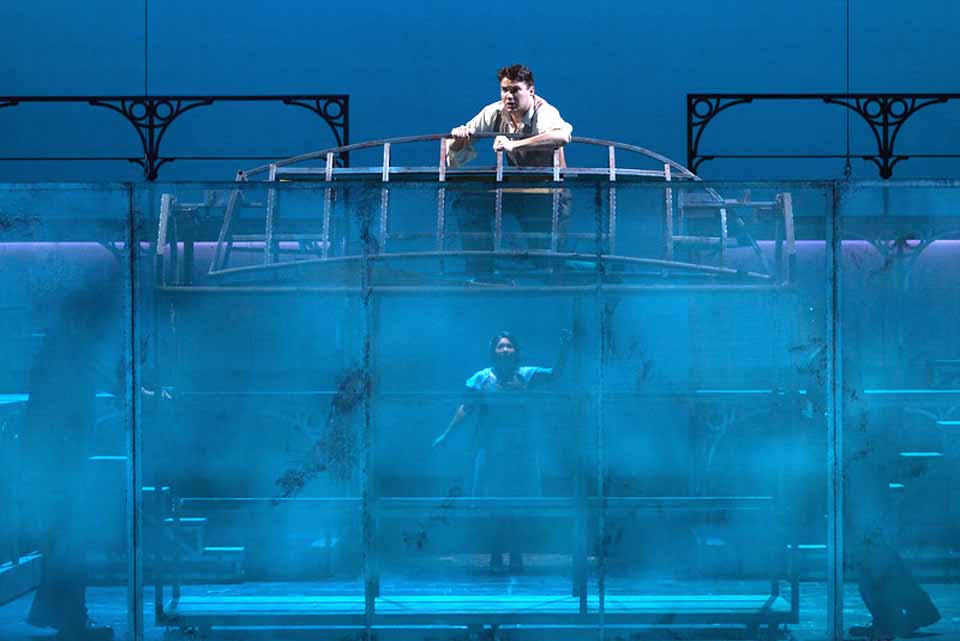American Tragedy, Operatic Triumph?

By ROBERT MOYNIHAN • allotsego.com
Too many superlatives exist in this Glimmerglass production for reservations – yet a few exist. On the positive side, the staging is brilliant – with multiple levels originally seen in Arthur Miller’s “Death of a Salesman.”
However, this staging far surpasses them. The horrible drowning – either by murder or accident – achieves a paradox of representative horror held within emotional bounds. So does the final electrocution, awful, but contained within the boundary of representative art.
Gene Sheer’s libretto moves without impediment – with a beautiful pivot in the church service at the middle of the work. The singing in that sequence is of recognizable melodic pattern.
There are serious social issues, however, that should first be addressed. Any murder of a young mother brings notice immediately to her male partner – and male violence against women, even without that ultimate horror, has increased.
There is less social control by extended families because of increased individual mobility. The dislocations encouraged by a corrupt tax system, the loss of millions of well-paying jobs, leave the young in rat-traps of frustration, whose expression is nihilism and social mutilation–beatings and even murder. The solution is not parsing these events in the paper or hearing them reported on what now passes for the “news.”
The solution is informed social change.
The main character of this opera – actual event–novel worked but “wanted more.” Methods of birth-control were not available. At the time of this murder and for years thereafter, advocates spent time in jail for advocating low birth-rates as a cure for poverty.
Birth control as a subject even now is a social victim of bigotry – and is not prominently mentioned as a remedy for world overpopulation-pollution or a solution for migratory abuses.
Anyway, protagonist Griffiths was trapped, his stories too inconsistent, his letters too incriminating. He never reported the accident, if it happened as he later told it. As a jailed inmate, he sold autographs and ordered catered meals.
Tobias Picker’s orchestral music for this work is masterful, with insistently inventive scoring, beginning with the techniques of modernism borrowed prominently from Stravinsky, Orff, Honegger, yet recovering to find an individual voice.
There are more than a few powerful moments of vocal expression. But – that reservation, that “but” is always a problem. For the rising and falling sequences of thirds, fourths, fifths – the measurement between separate notes – is an annoying mannerism of recent writing for the voice.
Those intervals are the distance from a preceding note, either rising or falling. It is repeated so frequently with minimal melodic invention that it seems to become inevitable at the end of repeated musical phrases.
This technique does not follow the human voice in its own melodic phrasing – but that too is a disappearing art. American speech is increasingly mono-tonal and uninflected – presenting an anti-aesthetic to be overcome in both verbal and musical art. Is either well taught?
Musical composition has a tradition of specific techniques, but the highest verbal art is poorly presented – if at all. One of the Ivy-towered gurus of recent criticism asserts that the use of language to represent emotion, essentially through euphony and cacophony, is an aberration.
Supposedly, obedience to a droning classroom voice is the latest burning bush of literary self-sufficiency.
This American Tragedy is, though, a strong work – even with these reservations. This is an affecting time at the opera – and praise to all.
Abest way to conclude is to list the major stalwart performers, the conductor, the designer. The Glimmerglass orchestra was again superlative, shooting the rapids of highly differing styles without capsizing.
Conductor George Manahan – Sets Alexander Dodge – Clyde Griffiths by Christian Bowers – Roberta Alden by Vanessa Isiguen–Sondra Finchley by Cynthia Cook.

